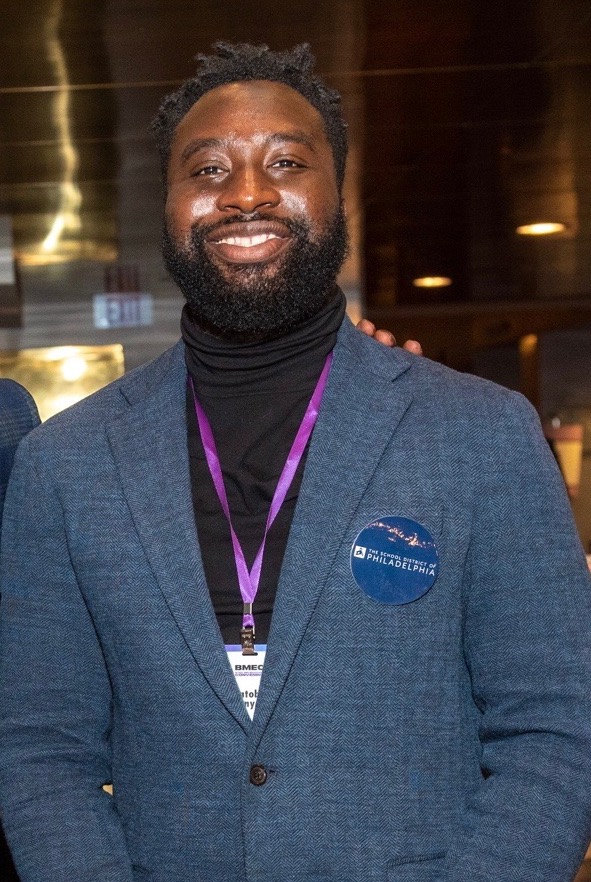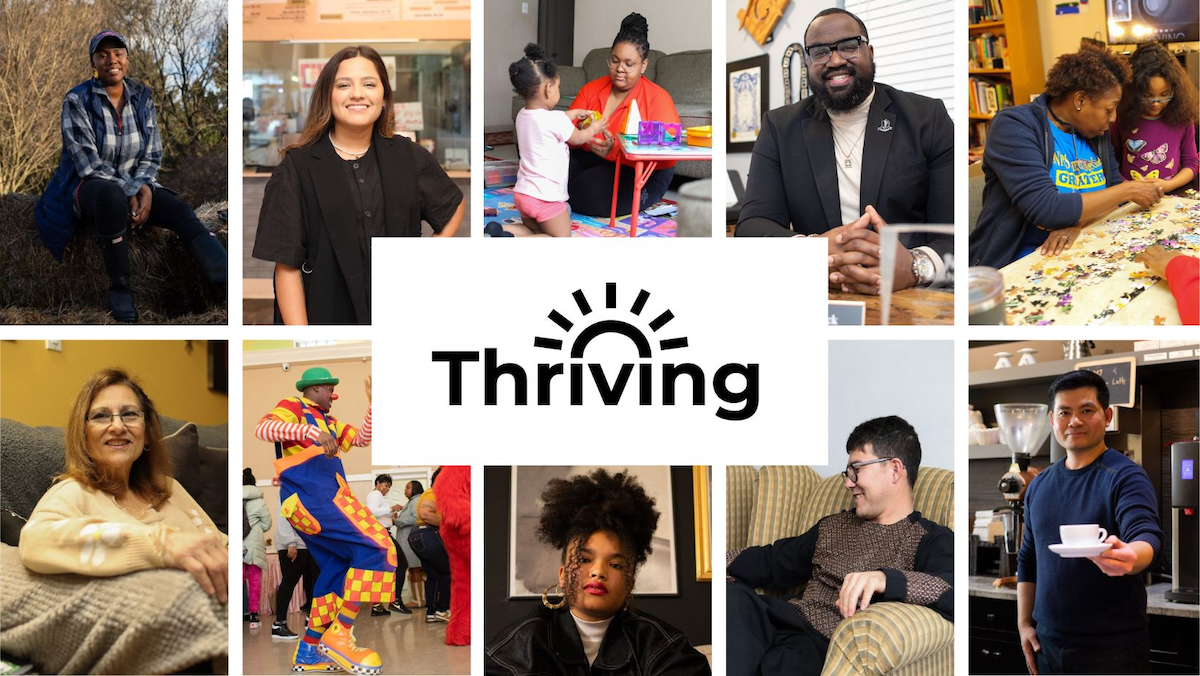That’s one of the takeaways from Thriving, Technical.ly’s yearlong reporting project that saw us talk to hundreds of people about their economic lives.
The mother who paid off a credit card while pregnant so she could start a savings account for her newborn daughter. The state agriculture director who stretched his final Ph.D. year over several semesters because he’d already maxed out student loans. The Afghan refugee who traded a money-making food service job for a lower-paying post that let him spend weekends with family. The gig worker who walked away from a full-time office situation to prioritize making art.
“It does feel like everything’s falling on me from both sides,” said Misha Cariola, an illustrator and graphic designer in Queen Village, describing what it was like to leave a desk job at the University of Pennsylvania and pivot to freelancing.
Getting rich isn’t one of her goals — but being able to afford healthcare is. “I don’t need to be making a ton of money,” Cariola said. “I just simply want to enjoy my life and do what I love.”
With backing from the Pew Charitable Trusts, William Penn Foundation and the Knight Foundation, Technical.ly arranged dozens of gatherings and interviews and meetups to ask people about their journeys to economic security, discussing obstacles they’d made it past — and what was still blocking their path.
How’d we decide who to speak with? After crunching data to find representative demographics groups, we focused on 10 key personas:
- Recent immigrants, who represent a significant component of our future workforce
- Older immigrants, who demonstrate how effectively our changing population can grow older where they live
- Immigrant entrepreneurs, who make outsized economic and cultural contributions to their communities
- Black working mothers, who are crucial leaders in an effort to break generational poverty
- Young Black men, who are a key demographic for economic and social change
- Middle-income Black residents, who can help us understand how to retain and share prosperity with more residents
- Black professionals, who show us how we can combat race-based income inequity and create opportunity
- Older working residents, who represent a major economic shift as many fall out of the workplace
- Disabled residents, who are a growing, diverse and often overlooked part of the American workforce
- Gig-working creatives, who demonstrate the vitality, flexibility and economic shortcomings of an emerging part of urban work
(Read the full explainer on why we chose these groups in English, Spanish or Chinese.)
Most of our reporting happened in Philadelphia, where Technical.ly was founded, as a microcosm of urban society in the modern United States. But Philly doesn’t tell the whole story, so we also examined what life was like for members of each demographic group in a peer city — Baltimore, DC, Boston, Brooklyn, Miami, Milwaukee and more.
One of the themes that emerged: Everyone’s path is different, but a common thread is community help.
Our reporting showed the power and importance of a network, whether built individually — through friends, family, or chosen mentors and kindred colleagues — or provided collectively, by nonprofits or government agencies. Getting ahead of the financial spiral is more feasible with a village behind you.

Oluwatobi Odusanya. (Courtesy)
“I’m here because somebody helped me to get to where I needed to get to,” said Oluwatobi A. Odusanya, a Northern Liberties resident who works at Vare-Washington Elementary. He’s now focused on helping other Black boys in Philly feel empowered to seek positions of power and create generational wealth.
How crucial someone’s childhood experiences can be in shaping their future career was another motif that surfaced throughout our reporting.
This idea isn’t new, but it played out again and again in the stories we heard. People who took inspiration from entrepreneurial family — “It was one of those things where some people espouse to have that risk-taking factor in their DNA,” said Rittenhouse resident Linda Orr, describing the choice to launch a woman-run construction company in the 1990s. People whose parents made sacrifices for their education, like LaToya Richie, a West Philly native who credits her two-bus-and-a-trolley trek to a pricey Catholic high school with setting the foundation for her career in healthcare law.
Sometimes even a promising beginning can get derailed by life’s events, which brings forward another throughline of this work: Some government programs developed as safety nets for marginalized residents can be frustrating in their bureaucracy.

Stacie Leap. (Courtesy)
Take Philly mom Stacie Leap, who lost her vision later in life. She applied for college education funding via the state Bureau of Blind and Visual Services — then saw her case sit in limbo, classified as pending for over three years. She didn’t wait around, though. She started a support group called the Pennsylvania Organization of Blind Parents.
“I feel like I’m thriving now, I’m doing something worthwhile,” Leap said. “I feel more at peace.”
That sense of optimism powered by tenacity carried through the hundreds of interviews. Check out the full scope of our reporting below.
Audio documentary: the ‘Thriving’ podcast
With project partners Rowhome Productions, reporter Nichole Currie followed 10 Philadelphians for a year as they pursued new ventures, navigated bureaucratic systems and sought to better their families’ financial outlook. Each person tells us something different about our collective future.
Meet them at the links below, and listen to the podcast here on Spotify or here on iTunes:
- ‘We are just trying to survive, which is different from living’: Afghan refugee Ghulam Danish on his journey toward thriving
- ‘It’s been such a shift’: Doriana Diaz on trying to make a living through gig work
- ‘I’m motivated by growth’: Gisselle Poveda on the challenges of expanding her small, immigrant-owned business
- ‘I just want to give her everything’: Erica Irving on building a better financial future for her family
- ‘I do believe I fell through the cracks’: LyVette Byrd on navigating life as a ‘suddenly blind person’
- ‘It’s up to us to put the footwork in’: Quan Fields (aka Quany the Clown) on making it as a circus performer
- ‘I’m impatient with my success’: Stephon Fitzpatrick on pursuing a Ph.D. and being a role model
- ‘There’s always a trade-off’: Croissant whiz Michael Tan on the challenges of expanding his small business
- ‘It’s not a job to me’: South Philly’s Linda Hines on learning new skills as a grandma who works
- ‘The aggregate of it all is amazing’: FarmerJawn’s Christa Barfield on growing an urban farming business
View this post on Instagram
Reported features: ‘What’s it like?’
How is it different to be a gig-working creative in Brooklyn than another city? What resources do immigrant entrepreneurs have in Miami compared to elsewhere? For each of our 10 persona groups, we spoke to people in both Philadelphia and a peer city, sharing how each is navigating unique economic challenges and opportunities.
Meet the people we spokes to from across the US here:
- What is like being a gig-working creative in Brooklyn?
- What is it like being an immigrant entrepreneur in Miami? (+ Spanish version)
- What is it like being a low vision resident in Boston?
- What is it like being a young and emerging Black man in Milwaukee?
- What is it like being an older working resident in Pittsburgh?
- What is it like being a middle-class Black resident in Baltimore?
- What is it like being a recent immigrant in Phoenix? (+ Spanish version)
- What is it like being a Black working mother in Washington DC?
- What is like being a thriving Black professional in Atlanta?
- What is it like being an older immigrant in Los Angeles?

Immigrant entrepreneurs from Miami, clockwise from left: Natalia Martínez-Kalinina, Suzan McDowell, Rosa Polo, Rodrigo Butori and JP Aramouni. (Courtesy/graphic by Julie Zeglen)
And meet the Philly folks we talked to here:
- What is it like being a gig-working creative in Philadelphia?
- What is it like being an immigrant entrepreneur in Philadelphia?
- What is it like being a low vision resident in Philadelphia?
- What is it like being a young and emerging Black man in Philadelphia?
- What is it like being an older working resident in Philadelphia?
- What is it like being a middle-class Black resident in Philadelphia?
- What is it like being a recent immigrant in Philadelphia? (+ Spanish version)
- What is it like being a Black working mother in Philadelphia?
- What is it like being a thriving Black professional in Philadelphia?
- What is it like being an older immigrant in Philadelphia? (+ Chinese version)

Gig-working creatives in Philadelphia, clockwise from top left: David Coleman, Kara Lindstrom, Joshua Meekins, Holden Blanco and Misha Cariola. (Courtesy/graphic by Paige Gross)
Quick hits: ‘Thriving’ mini episodes
Before we released the full audio documentary series, we teased each episode with a mid-project report on the person we were following.
Listen to them here:
- Meet Christa Barfield, an urban farmer and entrepreneur growing her legacy
- Meet Michael Tan, an Old City bakery owner recovering from pandemic setbacks (+ Chinese version)
- Meet Doriana Diaz, a Philly collage artist making her next move (+ Spanish version)
- Meet Linda Hines, a childcare worker looking to advance her career
- Meet Stephon Fitzpatrick, an agriculture education executive navigating his own higher ed expenses
- Meet Ghulam Danish, an Afghan refugee seeking a ‘normal life’ in Philly
- Meet Jaquan Fields, a Philly performer with dreams of starting a circus as diverse as his city
- Meet LyVette Byrd, a former counselor navigating life as a ‘suddenly blind person’
- Meet Gisselle Poveda, a cafe proprietor with dreams of building ownership (+ Spanish version)
- Meet Erica Irving, a Philly mom balancing a job search and childcare needs
View this post on Instagram
Focus groups: In-person conversation
In addition to the dozens of people who we interviewed for the audio documentary and features, we also spoke to dozens more Philadelphians during focus groups centered on each of our 10 personas. Those off-the-record conversations helped further inform this broader body of research.
We enlisted trauma-informed practitioners Michael O’Bryan and Hanae Mason to help us partner with community-based organizations and individuals who co-facilitated many of these discussions. The goal was to ensure we were partners with those we were engaging.
We also facilitated a regular gathering of other civic stakeholders, leaders and collaborators in order to better understand each other’s work and find solutions across sectors.

This report is part of Thriving, a yearlong storytelling initiative from Technical.ly focused on the lived experiences of Philadelphia and comparative city residents. The goal is to generate insights about the economic opportunities and obstacles along their journeys to financial security. Here's who we're focusing on and why.
- Thriving is a yearlong reporting project exploring the economic lives of individuals in various US cities, particularly focusing on Philadelphia.
- The project highlights 10 key demographic groups, showcasing personal stories that emphasize the diverse paths people take to achieve financial security.
- A common theme is the importance of community support and networks, whether individual or collective, in overcoming challenges and pursuing economic well-being.
Join our growing Slack community
Join 5,000 tech professionals and entrepreneurs in our community Slack today!
Donate to the Journalism Fund
Your support powers our independent journalism. Unlike most business-media outlets, we don’t have a paywall. Instead, we count on your personal and organizational contributions.

Maryland firms score $5M to manufacture everything from soup to nanofiber

National AI safety group and CHIPS for America at risk with latest Trump administration firings

Immigration-focused AI chatbot wins $2,500 from Temple University to go from idea to action


